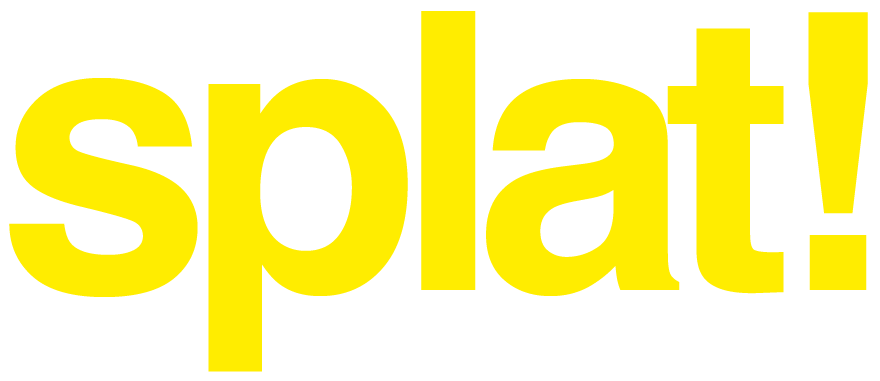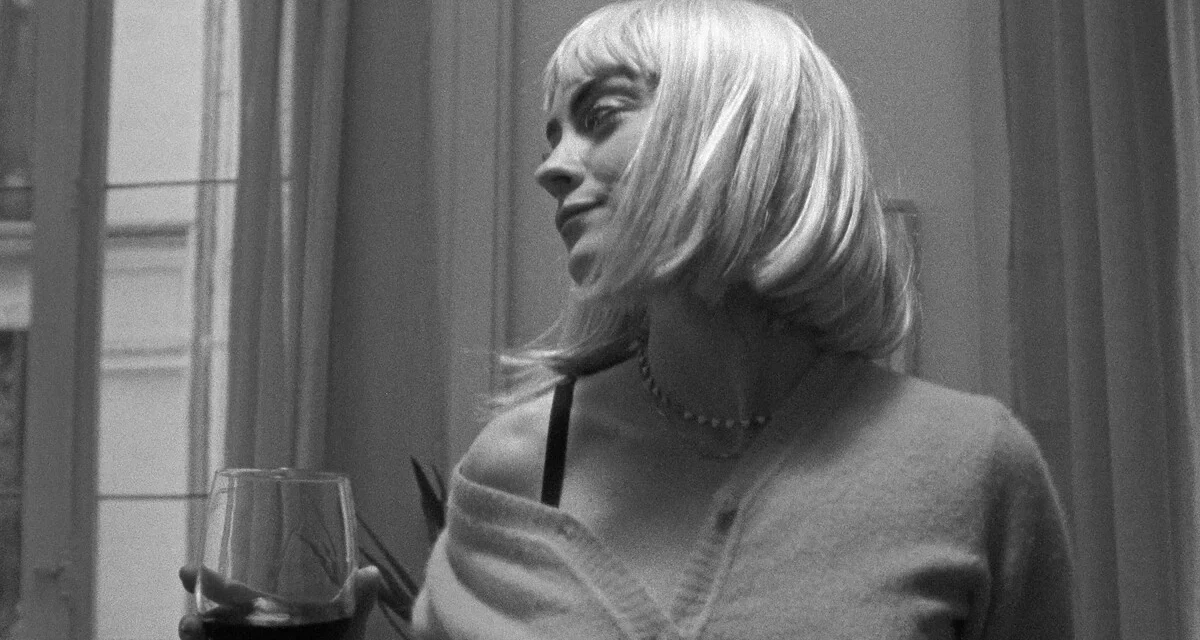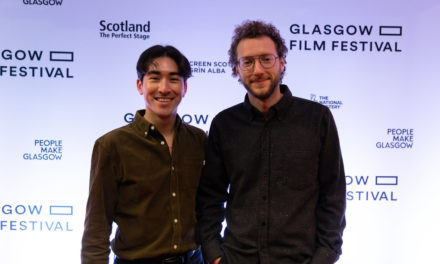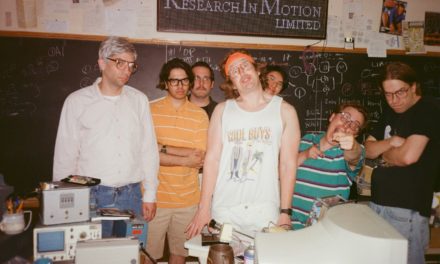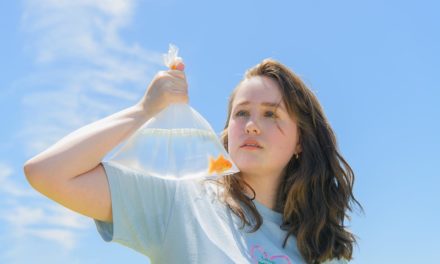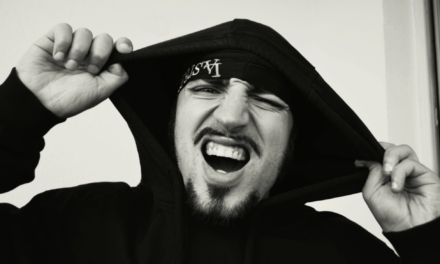Perhaps my favourite film of this years Glasgow Film Festival was Andrea Bagney’s debut ‘Ramona’. The film tells the story of the eponymous aspiring actress who, after living in London, returns to Madrid in hopes of starting a film career only to find herself in a strange relationship with a director. Naturally I jumped at the chance to chat to Andrea. The interview was conducted over zoom last week, Andreas in her beautiful Spanish apartment while I, forgetting the art of Zoom calls from my days of attending virtual film seminars, ended up having my face obscure by shadow, only my nods of agreement registering. I began the interview with a clumsily worded question about Woody Allen. However, aided by Andrea bubbly love of film and specifically Spanish charm, we quickly found good footing and ended up having a very dynamic and lively conversation on the topics of directors strange love affairs with actors, what shooting both on 16mm and in black and white brought to the project and, eventually, back to Woody.
The film is very much about this relationship between a director and an actor and the power dynamics of that, the way it’s gendered is interesting because he’s a slightly older man. You’ve also got this thing where it feels like it’s inspired by Woody Allen’s work. I think that jumped out at me thematically.
Andrea: Regarding the director/actor relationship, it is one that definitely I wanted to explore. I think it’s a fascinating relationship, it’s not easy, it’s complex. And it does have a lot to do with seduction and desire, and not necessarily in a sexual way, between two people. For me, I had to fall in love with Lourdes Hernández, who plays Ramona, to cast her. And I’m totally fascinated by her. I love the way she moves, the way she looks, but I’m not attracted to women in a sexual way. So how complicated would that have been if I was a man? For me personally, the way the story came into my head was when I was taking an acting course, not because I ever wanted to become an actress, I wanted to learn how to direct actors better. And there was this teacher who was an important Spanish filmmaker, a man, I’m never going to say his name obviously. And he really liked one of the girls there and he was very open about it and it was kind of funny but not really. Because what if that girl really wanted to be an actress and he cast her in a movie? And what if she was married? I built it from there, so the movies written as a comedy. That scene during the casting is a comedy, for sure, but one layer below that it’s not funny how this man thinks he can say these things about young aspiring actress in front of a bunch of people, this is a professional context. She should not be put in that situation. So Ramona’s reaction is really funny because she has this big personality and she just goes “but you’re casting me for the wrong reasons”, but it’s not funny because many women feel tiny in that context. I don’t know if I answered your question.
I feel like the way I asked it was very dense. But that is what I was trying to get at is that I think it’s not even to do with the cultural context, it’s just generally about the dynamics between people. And the way you reveal the information, you feel like it’s going to be a romance at the start and then we don’t know she has a fiancé and we’re slowly getting these depths to her character that reveal themselves. I was wondering, linked to that, the way you direct the performances, they feel very finely crafted and a lot of its about what they don’t say or these little moments where you reveal something in a sort of slight of handy way.
Andrea: I think that the basis is the script. So it looks like the performances are improvised in that they’re very natural, they are not. They are 95% pure script and because we did very few takes, like maybe an average of two take, there wasn’t really any room for me to say: “hey guys, you know what? Do what you feel, let’s see what happens”. No. I did not have enough film for that, or time, or anything. So we rehearsed before, especially regarding rhythm and the emotional places where they had to be at during the scene[s]. But once I said action, and this is the magic of shooting in analogue and not digital, the actors knew that this was it. So no matter what happened, if somebody was silent for a second or if something fell whatever happened had to be incorporated. So I think that theres this extra level of truth there because they were 100 percent there, everything had to be incorporated and it just speaks to [the] great actors I had. I really think that they are amazing in the movie and that they brought these characters to life and gave them all of these layers that they brought themselves. But it also speaks to how theres a technique, first in script writing and secondly in learning how to throw lines at each other at a certain rhythm with the camera at a certain place. So it’s like a mix of something very technical with something very magical.

Its interesting you said that you shot it on film because I didn’t realise that, it looks amazing and I noticed that there is a grainy quality to it but sometimes its hard to tell if thats added.
Andrea: No, no it’s shot on film.
How early into the process of preproduction did you decide to shoot on film?
Andrea: Well, I’d never shot on film in my life because I’d hardly done anything before. I did this short film and thats in digital but I did study film for a year and I’d always wanted to shoot in analogue. But when I was planning Ramona I wanted to shoot in analogue I thought it’ll never have the money. I’ll never have the production team in order to do [so]. And when Sergio, who’s a producer, when he came on board he’d made films before that he shot in 16mm. I told him I really would love to shoot 16mm, thinking he was going to tell me “oh forget it”. He answered “yes, thats great but if you shoot it in analogue it means you need to plan everything really well so you get to shooting everything BAM! BAM! BAM! So I think it’s a great idea”. And I thought: “Really? Ok!”. So from that moment I was telling people “I’m going to shoot this in 16mm film in black and white” and everybody was like “oh, you’re crazy!”
Well it worked, you proved them wrong.
Andrea: No honestly [I] truly think that, and this is not to say that films shot in digital aren’t good theres big masterpieces done in digital for sure, but the way I made Ramona, if I had done it in digital, it would not be half the movie we had. Part of the charm that it has is because we shot on film, because it just put the actors and the whole team at a completely different place.
Right, it changes the tone on set which also informs how the film feels.
Andrea: Of course, because the set is the film that you see, it’s created on set you can’t escape [it]. All these technical decisions become a big part of the soul of the movie.
The black and white is part of that was well. We have these moments that arn’t in black and white when she is acting and it creates this really interesting layer to the performance. Because she’s performing but thats the only bit we see the full reality of, so to speak, when it’s in colour.
Andrea: I’m going to answer your Woody Allen question. Basically the movie was born in my head in black and white because when I thought; I’m going to write this movie and it’s going to be about this aspiring actress and she’s going to be called Ramona. I already told you how it came into my head, I met this director going this course blah blah blah…. and at that point when I pictured this I saw her as a Woody Allen character or as a Billy Wilder character. I wanted to make The Apartment or Manhattan but in Madrid with a woman as protagonist. And obviously Frances Ha was a reference to something somebody had done similar, like a woman in New York in black and white, but its not like I wanted to be Frances Ha its just that Frances Ha served as a ‘oh somebodies done this similarly before so you’re not a crazy person, you just have a sensibility which is close to Noah Baumbach’. Do you know what I mean? It helped me feel secure [in my] decision. Woody Allen in general is a filmmaker who’s films I’ve watched since I was a kid and who I greatly enjoy, especially his script writing. And when I had to pick the monologue that she says in the casting Annie Hall came to me, I couldn’t even explain why, very naturally as this female character that I think has many layers and we all love. And actually when I was looking for my Ramona, the actress, I wanted somebody like Dianne Keaton and like Shirley McLaine. I wanted that sort of charm and energy that I see in Woody Allen movies and Billy Wilder movies.
“For me, part of filmmaking [is that] I can’t act like this is not a movie. I don’t think I will ever make a movie that doesn’t play with the audience”
Andrea Bagney
I just brought it up to begin with because it’s a bit affronting to have that as an inspiration front and centre. Because I feel like everyone has quite a complex relationship with Woody Allen as a filmmaker, he has done so much good stuff but then obviously it’s complicated by him as a person. And the thats sort of what the films about in a way, like its slightly self-conscious about the fact that this is a women being put in a male perspective, even though you’re directing it. But her character is being put into a film made by this man and how he views her.
Andrea: And then he portrays her as a prostitute…
Yes exactly, and then when your watching that film it feels so disingenuous compared to the actual film you’re watching, theres these metatexual levels.
Andrea: Oh yeah because theres this thing of men feeling very offended by women who don’t love them back and therefore calling them prostitute, this really typical dynamic. This came out of me unconsciously. I just tried to picture what kind of movie this particular character [would make] and this came out of me. And then thinking about it later I thought ‘oh wow so she’s a prostitute in his dream?’ Also, I forgot to mention what you asked before about her being very real when we see her in colour. For me, part of filmmaking [is that] I cant act like this is not a movie. I don’t think I will ever make a movie that doesn’t play with the audience, that doesn’t let the audience think ‘oh so this is a movie so theres going to be this music and now they kiss’. And I love that about movies, that you enter this code of fiction. But then truly good fiction always comes from something that is very true. And that [is] contradictory about film, because it’s like a good act is not really an act it’s real. I love to suddenly see the film in colour because then when you see her in colour she is theoretically acting in front of the camera but she seems so real all of a sudden. And thats something thats really mysterious and beautiful about cinema, the fact that we see reality through the lens of a camera and for some reason a camera expands reality, it shows you the truth much [more] than your eyes. When you see someone, but then you film them and you look at what you’ve filmed, you see a lot more.
